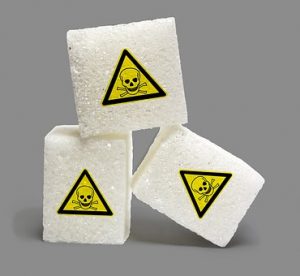Sugar is everywhere!
But, you should get no more than 10% of daily calories from sugar = 25g of sugar; 4g of sugar = 1 tsp sugar. Sugar-sweetened beverages provide no health benefits and reducing consumption could prevent tens of thousands of deaths each year.
- a 12oz (355ml) can of coke contains 39g of sugar
- drinking diet pop increases your likelihood of weight gain more than regular pop as your brain is not fooled by artificial sweeteners and simply increases your craving for sugar
Sugar Aliases to be aware of:
- Aspertame
- Cane Juice Extract
- Corn Syrup
- Dextrose
- Evaporated Cane Juice
- Fructose: this is a natural sugar from fruit that doesn’t activate insulin. It provides energy but no nutrients. It is processed by the liver for energy but high doses can harm the liver and lead to insulin resistance. The excess fructose is turned into triglycerides to become EITHER very low density lipoproteins (VLDL) which promotes cardiovascular disease OR excess fatty acids that stay in the liver to promote hepatic insulin resistance which leads to weight gain and Type 2 Diabetes. On the other hand, the fructose in fruit comes with fibre which slows the digestion of sugar
- Glucose is metabolized by cells for energy and is a crucial brain fuel. It generates an insulin response and has a high Glycemic Index (rapid rise in blood glucose), which boosts energy, then causes a dramatic drop and sluggishness. Too much glucose in the bloodstream causes cells to stop responding to insulin while the pancreas keeps producing more insulin until it maxes out and blood sugar keeps rising
- High Fructose Corn Syrup: this is in soft drinks (7 – 8 tsp of sugar) and leads to metabolic syndrome, fatty liver disease & diabetes
- Lactose
- Maltose
- Pure Fruit Juice: sounds healthy BUT: the concentration of fruits to make the juice can end up containing 5 tsp (25g) of sugar per cup! 3 servings per week can raise diabetes, so better to drink water and EAT fruit.
- Sucralose (Splenda) causes higher glucose and insulin levels
- Sucrose (table sugar): this carbohydrate is made up of 50% glucose and 50% fructose from sugar cane or sugar beet
- Sugar Alcohols (Sorbitol & Mannitol): these are OK but can cause digestive upset (I have to avoid them)
Various sugar substitutes exist BUT have good and bad qualities you should be aware of:
Agave Syrup:
- Good: it does not raise blood sugars as dramatically as refined sugar so is considered low glycemic
- Bad: it’s very high in calories and fructose (92%)
Cane Sugar is 50% fructose
Coconut Sugar is 79% sucrose and 3-9% fructose
Honey is high fructose but includes amino acids, antioxidants, enzymes, vitamins and minerals
Maple Syrup has fewer calories, lower GI than honey and contains manganese and zinc
- Good: when raw, locally produced without processing, honey and maple syrup contain all needed trace vitamins & minerals and have a moderate GI Index
- Bad: these contain 85% sugar
Stevia is calorie-free and has a zero GI
Healthy Alternatives include:
Barley Malt, Barley Syrup, Blackstrap Molasses, Coconut Syrup, Herbal Sweeteners, Rice Syrup, “Fruit Source”, Sucanat Evaporated Cane Juice, Stevia or Truvia (which have a 0 GI Index), Yacon Sugar has a low GI Index and half the calories of sugar
You can also substitute mashed bananas, applesauce or fresh fruit purees:
1 cup of sugar = 1/2 – 1 cup of puree (if using fresh fruit, reduce the other wet ingredients in your recipe by 1/4 cup)


